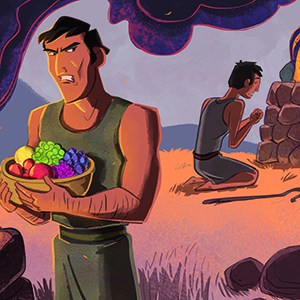Cain and Abel
 The story of Cain and Abel, recorded in Genesis 4:1-16, reveals that evil is growing and having an impact that goes beyond Adam and Eve both in its reach and also in its intensity. The sin committed by Adam and Eve in the garden may seem small at first, but the story of Cain and Abel (just verses after Adam and Eve sin) makes it clear that evil is now growing and it’s growing rapidly. Within just one generation, sin has progressed to the murder of a sibling. Adam and Eve ate the fruit in the naive belief that “it was desirable for obtaining wisdom” (Gen. 3:6). It hasn’t turned out that way. Such is the power and consequence of evil.
The story of Cain and Abel, recorded in Genesis 4:1-16, reveals that evil is growing and having an impact that goes beyond Adam and Eve both in its reach and also in its intensity. The sin committed by Adam and Eve in the garden may seem small at first, but the story of Cain and Abel (just verses after Adam and Eve sin) makes it clear that evil is now growing and it’s growing rapidly. Within just one generation, sin has progressed to the murder of a sibling. Adam and Eve ate the fruit in the naive belief that “it was desirable for obtaining wisdom” (Gen. 3:6). It hasn’t turned out that way. Such is the power and consequence of evil.
Eve Gives Birth to Cain and Abel
As we approach this story, it’s important to remember that this is the first story to be recorded following Adam and Eve’s sin. Everything has changed now as a result of sin. Life goes on, as indicated by the fact that procreation is taking place and noted in the first verse of chapter 4. And yet, humankind is now outside of the garden. The world as we now know it is in exile from what God intended.
We quickly learn that Eve gave birth to Cain and then Abel. Cain “worked the ground” (v. 2), but Abel “became a shepherd.” There is no indication in the text that either occupation is preferred or better than the other. Both occupations are essential to sustaining life and community. Both brothers bring offerings to God, but God “did not have regard for Cain and his offering” (v. 5).
We should be careful about speculating as to why God didn’t “regard” Cain’s offering. The text simply doesn’t say. What is clear, however, is God’s response in verses 6 and 7. God asks Cain, “If you do what is right, won’t you be accepted?” Apparently, Cain did not “do what is right” and his offering was, therefore, rejected. In the larger context of the Old Testament, we should understand that Cain simply didn’t have a right heart before God. When King Saul would later justify his disobedience by offering a sacrifice, Samuel states a principle that is relevant here… “Does the Lord take pleasure in burnt offerings and sacrifices as much as in obeying the Lord? Look: to obey is better than sacrifice…” (1 Sam. 15:22). Obedience here signals a right heart that bears fruit in right living.
Sin Is in the Heart
This is important in this context because it points to the nature of sin and evil. The consequences of Adam and Eve’s sin is far-reaching from a cultural standpoint, but it also reaches into the hearts of humankind. Sin cannot be covered by mere ceremony or sacrifice. Acceptable worship must be accompanied by a right heart. Sin and evil is, first and foremost, a problem of the heart rather than behavior.
God warns Cain that “sin is crouching at the door. Its desire if for you.” (v. 7b). Cain is challenged to “rule over” sin (v. 7c), which is an act of the heart. This is crucial in understanding the story and underscores that sin and evil is an internal reality now to humankind. The sin of Adam and Eve is taking root in the hearts of their offspring and is having an immediate impact on all of humanity.
Rather than “rule over” sin, Cain lures Abel into “the field” and kills his brother. Sin and evil is internal, but it has implications that go beyond the individual’s heart. Sin bears fruit in actions that destroy those around us.
Sin Is Spreading
As with Adam and Eve, God questions Cain, “Where is your brother Abel?” And, as with Adam and Eve, Cain’s response is defiant and evasive, “Am I my brother’s guardian?” (V. 9). The echoes of the first sin, just one chapter earlier, are obvious. The sin of Adam and Eve will not be contained and limited to their lives or generation. Sin and evil are spreading.
God condemns Cain to a life of wandering in which the ground “will never again give you its yield” (v. 12). Cain, like his parents, will live as an exile in a world that is now operating under the curse of sin and evil. The curse on Cain reminds us of the curse on Adam…
The ground is cursed because of you. You will eat from it by means of painful labor all the days of your life. It will produce thorns and thistles for you, and you will eat the plants of the field. You will eat bread by the sweat of your brow… (Gen. 3:17b-19a).
God places “a mark on Cain so that whoever found him would not kill him” (v. 15). Even though evil is destroying life and Cain is guilty of murder, God acts to restrict further bloodshed by protecting Cain. This is an important reality to recognize in this story. God is still engaged and acting to accomplish His purposes. Sin and evil are spreading, but sin will not be allowed to run rampant. God has a plan that was revealed in Genesis 3:15 and He will work to see His plan come to fruition. Evil is wreaking havoc on the world, but there is hope.
In the meanwhile, humanity is living in a new reality of a broken world. Cain carries a level of God’s protection, but he then “went out from the Lord’s presence…” (v. 16). These are tragic words and reflect the tragic consequences of the sin that was committed in chapter 3.
When We Minimize The Seriousness Of Evil
We sometimes prefer not to think about sin and evil. But ignoring the power of evil isn’t healthy. The story of the Fall (Adam and Eve’s sin) and the story of Cain and Abel (not to mention Noah and the Tower of Babel) are carefully placed at the beginning of the biblical story precisely so we would understand what the rest of the story is about… evil is destroying God’s good creation, including people, but God has a plan to fix the problem. When we minimize the seriousness of evil by ignoring it, we also minimize God’s solution to the problem.
A Big Problem Requires A Big Solution
Evil is so great that it will require the sacrifice of God’s own Son. Nothing less will do. Further, it’s now apparent that evil is in us. It’s not a distant threat from which we can run or hide. Evil is real. Evil is serious. And evil is within us. We can’t deal with evil on our own. It will require God to act on our behalf and that is exactly what He will do. We need God to do something about evil in our world and in our lives. The stories found in the early chapters of the Bible (Gen. 1–11) tell us that God has a plan and He is acting within history to bring His plan to fruition.
Jesus is the solution to the problem. Jesus is at the heart of God’s plan to destroy evil and restore creation. Jesus’ crucifixion will accomplish victory over evil. His victory, however, will be underestimated and minimized if we don’t understand just how powerful, catastrophic, and pervasive evil is.
Adults and Children Need to Learn About Cain and Abel
This is an important truth that all of us, including children, need to understand as much as possible. Evil is the enemy and it is in us. Only Jesus and what He accomplished on the cross can conquer it. As adults, we should have no trouble grasping this truth. Children will need to grow into an appropriate understanding of this reality. Parents and teachers can help them, however, by not minimizing the reality and presence of sin in all of our lives, including the lives of our children. Like Cain (and Adam and Eve before him), we have an inclination toward self-gratification and the sin that comes from it. The better we understand the power of sin within us, the better we will understand the work that Jesus accomplished on the cross. The story of Cain and Abel can help adults and children gain a better understanding of the power of sin and the need for a Savior.
You can find all of the activities related to Cain and Abel here.
Go here to find another helpful article about Cain and Abel.



